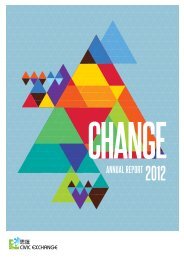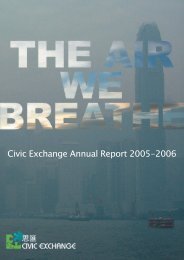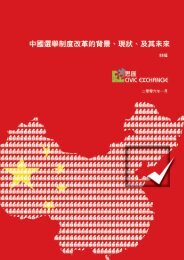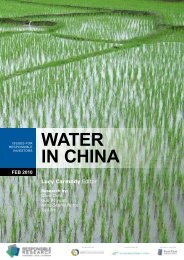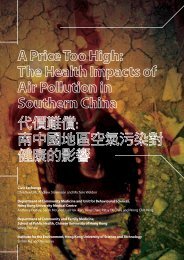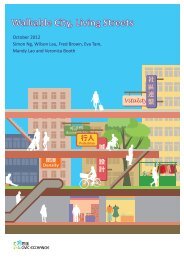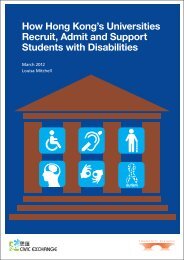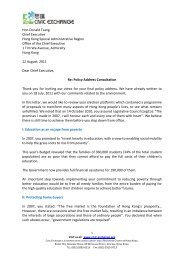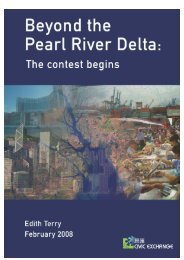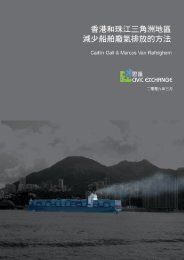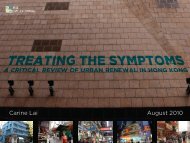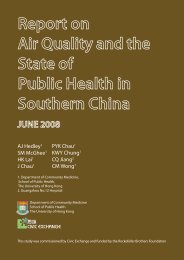Untitled - Civic Exchange
Untitled - Civic Exchange
Untitled - Civic Exchange
Create successful ePaper yourself
Turn your PDF publications into a flip-book with our unique Google optimized e-Paper software.
SUSTAINABLE TRANSPORT IN HONG KONG: DIRECTIONS AND OPPORTUNITIES<br />
7. The POAS provides an opportunity to align policy and implementation in order to move towards<br />
a more sustainable transport system for Hong Kong, although early signs indicated that sustainable<br />
development was not a goal of the architects of the new system. However, subsequent changes in<br />
the configuration of several portfolios, particularly the amalgamation of the Environment portfolio<br />
with Transport and Works, are more positive. 236<br />
7.3 Current decision-making structure<br />
Several policy bureaus and departments have responsibilities relating to transport planning and the execution<br />
of transport decisions in Hong Kong. The decision-making system is vertically organized with relatively<br />
weak horizontal links, resulting in a disjointed process of policy formulation that gives exceptional authority<br />
to transport officials over their peers in other bureaus. 237 The system does not appear to be sufficiently<br />
integrated so that there is a continuous and conscious learning and feedback loop that is rigorous and<br />
informative. Those at the highest level of the administrative system have not shown an inclination to<br />
question the basis for specific policies, enabling certain biases to continue to dominate decisions. Elected<br />
bodies play an important role in stopping decisions at the final stages of implementation when they are<br />
blatantly problematic, but in a more effective system, these issues would be picked up much earlier.<br />
Transport Bureau, Transport Department, and Highways Department<br />
At the core of the decision-making structure is the Transport Bureau (TB), which is charged with the<br />
responsibility to "provide a safe, efficient, reliable, and environmentally friendly transport system, which meets<br />
the economic, social and recreational needs of the community, and is capable of supporting sustainability and<br />
the future development of Hong Kong." 238 The TB's main responsibilities are to formulate policies on:<br />
• Development of Hong Kong's transport infrastructure;<br />
• Provision of transport services;<br />
• Management of traffic; and<br />
• Introduction of environmental improvement measures in transport-related areas. 239<br />
The Transport Department (TD) and Highways Department (HyD) provide support for the work of the TB.<br />
The various areas for which the TD and HyD are responsible are listed below.<br />
Transport Department (TD)<br />
• Implement policies on public transport<br />
development;<br />
• Franchising and regulation;<br />
• Assist in the formulation of infrastructure<br />
development programs;<br />
• Plan and implement traffic management, road<br />
improvement, and pedestrian schemes; and<br />
• Manage tunnels, bridges, parking meters, and<br />
government car parks.<br />
Highways Department (HyD)<br />
• Expand and improve road network;<br />
• Provide technical support for the planning,<br />
design and construction, and maintenance of<br />
roads; and<br />
• Implement rail development decisions<br />
Source: Transport Bureau (2001), Environmental Report of the Transport Bureau, Transport Department, and<br />
Highways Department 2000-01, Hong Kong: HKSAR Government.<br />
74<br />
236<br />
The HKSAR government moved a motion debate in the Legislative Council on May 29, 2001 to seek legislative<br />
support for the POAS and at the same time announced a different configuration of several portfolios in response to<br />
legislators' demands.<br />
237<br />
Although this issue is beyond the scope of this chapter, it would be useful to trace the reasons why transport<br />
planning has become so dominant within Hong Kong's civil service.<br />
238 HKSAR Government (2001), "Policy Objectives," 2001 Policy Address, Hong Kong, Vol.2, Sec.31.<br />
239 Transport Bureau (2001), Environmental Report of the Transport Bureau, Transport Department, and Highways<br />
Department 2000-01, Hong Kong: HKSAR Government.



